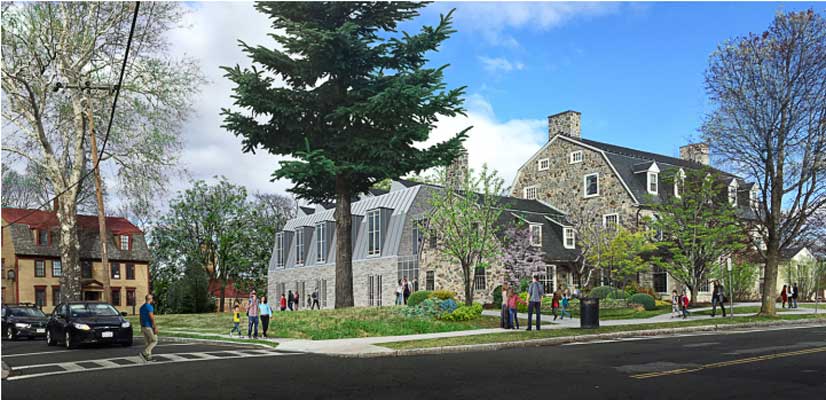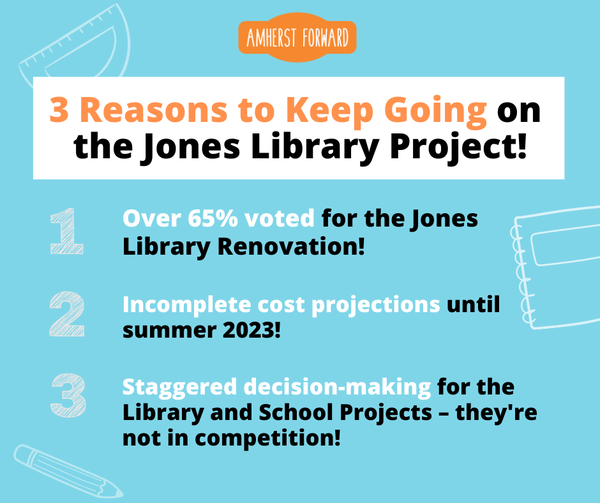Issues & Analyses: With Council Library Vote Amherst Forward Scores A Victory

Photo: https://www.joneslibrary.org/
Jones Library News Highlights For The Week Of September 20, 2022
Political Action Committee’s Ties To Library Project And Majority Of Town Council Pays Off
The Town Council’s 8-5 vote to push forward with the alarmingly over budget $50 million Jones Library renovation-expansion project reveals a political dynamic that has emerged with the adoption of a new government charter by the citizens of Amherst in 2018.
[See related Council Votes To Forge Ahead With Library Project Despite Escalating Costs]
The Amherst Forward Political Action Committee was organized in September 2018, shortly before the first election of a 13-member Amherst Town Council. Initially claiming that it was not a PAC, the group proceeded to survey candidates for Town Council and endorse those whom it viewed as supporting its “smart development” principles. Leading up to the inaugural 2018 council election, Amherst Forward endorsed 14 candidates, 8 of whom were elected. All 8 were among the 10 councilors who voted in April 2021 to authorize borrowing $35.3 million for the Jones Library building project.
Amherst Forward resumed endorsing candidates for the November 2021 local election. Of the 11 candidates that the PAC supported, 9 were elected, though one, at-Large candidate Ellisha Walker, had previously disavowed the endorsement, stating that Amherst Forward had given its endorsement without her permission.
The eight successful candidates who had been willingly endorsed by Amherst Forward were Mandi Jo Hanneke, Andy Steinberg, Michele Miller, Patricia De Angelis, Lynn Griesemer, Anika Lopes, Shalini Bahl-Milne and Ana Devlin Gauthier. These councilors are the eight who voted to forge ahead with the $14 million over budget library building project, despite significant uncertainty around fundraising capabilities and a projection that designer fees required to carry the project to the construction bid phase would be about $2 million. To put that figure into perspective, $2 million is roughly the amount needed to be raised to build a new high school track, or the amount of funds sought for Amherst’s landmark reparative justice initiative.
Amherst Forward’s willingness to overlook the negative impacts of the library project and its determination to push the project forward, seemingly at all costs, is better understood with a knowledge of its leaders. The PAC’s website lists ten members of its leadership team. Notable among them is fundraiser Kent Faerber, co-chair of the Jones Library project’s Capital Campaign, and the person credited by Library Trustee Chair Austin Sarat as calling together the initial group to plan and advocate for an expanded Jones Library. Faerber’s political activities have extended to managing the election campaigns of Library Trustees Sarat and Tamson Ely and chairing the Vote Yes For The Jones Library ballot committee.
Joining Faerber on the Amherst Forward Leadership Team are Matt Blumenfeld and Claudia Canale-Parola, principals of Financial Development Agency, Inc (FDA). FDA has reportedly received several thousand dollars in contracts with the Jones Library to assist with fundraising. The Massachusetts Chapter 30B Hotline has advised that the hiring of FDA without a competitive bidding process is legal, since the Jones Library is a private corporation and funded the contracts from a donor bequest, but that it goes against the state’s recommended procurement best practices.
A fourth member of the Amherst Forward Leadership Team is Heather Sheldon. According to her LinkedIn page, Sheldon is a Senior Designer with Kuhn Riddle Architects. Kuhn-Riddle was hired by the Jones Library to produce a cost estimate for work on the Library limited to repairs only.
Two past members of the Amherst Forward Leadership Team also have strong library ties. Ginny Hamilton is currently employed by the Friends of the Jones Library as Capital Campaign Manager. And formerly on the PAC’s Leadership Team roster was Farah Ameen, who now serves on the Jones Library Board of Trustees.
Being heavy with established fundraisers provides Amherst Forward with a distinct advantage. Leaders who are also professional fundraisers come with well established networks of contacts, and well-developed relationships with wealthy and influential potential donors. Amherst Forward’s reach includes 1,186 Facebook followers. The PAC has proven particularly effective in controlling the narrative around the multi-faceted Jones Library building project, an ability that has extended to the town councilors that it has helped get elected.
This is not to say that these councilors take their marching orders from Amherst Forward, nor that there is anything inappropriate in advocating for a Jones Library expansion. But, as can be unsettlingly witnessed on the national stage, organization, messaging and money can have a profound influence on political decisions and on voters who may not have the time or tools to dig below the surface when evaluating candidates or issues. Readers may decide for themselves whether this dynamic is playing out in Amherst, and whether it is a healthy one.




Numbers do not lie. They are what they are. But how they are gathered, interpreted, and in what context they are presented can make them serve the subjective needs of those who manipulate them, rather than leading to some seemingly objective truth.
The Amherst Forward graphic shown in the article asserts that “over 65% voted” for the renovation. In another article, we are given the figure of “3231,” the number of individuals who voted in favor of the renovation. Both numbers imply widespread public support for this project.
What is missing is the context of these numbers. Presumably the 65% refers to the total number of voters who actually voted on this question, rather than the total number of eligible voters. It would be instructive to see what the total number of voters enrolled in town is, and then to look at what percentage of those actually voted on the library question — including those who voted yes, those who voted no, and those who left the question blank.
Looking at a townwide context will give us a more accurate figure of the level of public support for this project. Since supporters of the renovation claim it is for the benefit of the entire town, then the figures given should reflect a more complete perspective.
and of course it is dishonest for the AF folks to be talking about widespread voter support for THIS project as this is not the project that the voters approved. The library that the voters are likely to get will be a considerably diminished building at a substantially higher cost and given the changed positions of people like Jones Treasurer Bob Pam and Alex Kent (see comment below) it seems reasonable to speculate that voters would not have approved the project into which the Jones demolition/expansion has morphed.
“Over 65% voted for the renovation” and “overwhelming support” make good sound bites, but discerning citizens realize that the more than one-third of Amherst voters opposing the library project, even before its financial excesses were known, is significant. In fact, in most communities in Massachusetts (and in pre-new-charter Amherst) this referendum outcome would have resulted in the defeat of the borrowing authorization. Mass. General Laws 44.7 leads off with “Cities and towns may incur debt, by a two-thirds vote.”
The intent of this law is to make sure that voters are solidly united in incurring a debt that may burden a whole generation of taxpayers. Amherst Forward worked quite hard to ensure that a new town charter with citizen decision-making power greatly diminished was passed in 2018.
The contention that the library and school projects are not in competition is misguided. Staggered decision-making doesn’t mean the debt repayments won’t overlap – they will, and for decades.
If I understand municipal finances correctly, there are two primary ways for the town to pay for large capital projects:
1) the Capital budget (a portion of property tax revenues earmarked for capital expenses) or 2) through an Override (a property tax increase beyond the 2.5% allowed).
There are also “Reserves,” which I think of like a savings account. They will be needed when annual debt service costs exceed the available capital budget.
Right now, the plan is for the town’s portion of the elementary school to be funded via an Override while the library will come out of Capital. It is not yet known what the total cost to the town will be for the school project, but if it is considered too high of a risk to put it all to a public override vote (or if costs increase between when the MSBA grant is set and borrowing is authorized and when bids are received), then Town leaders and the Council may decide to use the capital budget and/or reserves for some of it. That is when the library and the school will be competing for the same limited pool of money.
Incidentally, all other town capital needs (roads, sidewalks, fire station, DPW, building repairs, vehicles, equipment, etc.) have to come out of the capital budget too. It is already insufficient to afford all that is needed, even before the debt payments for any major capital project kick in.
This background is invaluable, Jeff. It nonetheless appears that the Library Trustees have not always paid FDA from private funds, e.g., a donor bequest to The Jones Library, Inc., for FDA’s sole-source fundraising contract.
In at least one year prior to the COVID, the Library Trustees apparently paid for FDA’s no-bid contract with more than $40,000 in state aid — taxpayer money — which the Massachusetts Board of Library Commissioners (MBLC) was to pay the Town that year for the Jones Library. I was present at their meeting in the 3rd floor room when they decided this.
They were discussing the Library’s upcoming annual budget. It was tight. There was no money for a renewed contract with FDA. That is, the Trustees, apparently acting in their public capacity as Trustees of the Amherst Town Library, presumably wanted to pay FDA from a pot that included taxpayer money.
The Library Director then announced that the MBLC, next fiscal year, would be paying the Town more than $40,000 in state aid on behalf of the Library, and that this could pay for FDA. The Trustees thereupon agreed. Presumably it’s in the minutes. Would that use of public money comport with Massachusetts public contracting law, even if the Trustees entered into a no-bid contract with FDA in their private capacity, as Trustees of The Jones Library, Inc.? Interesting question.